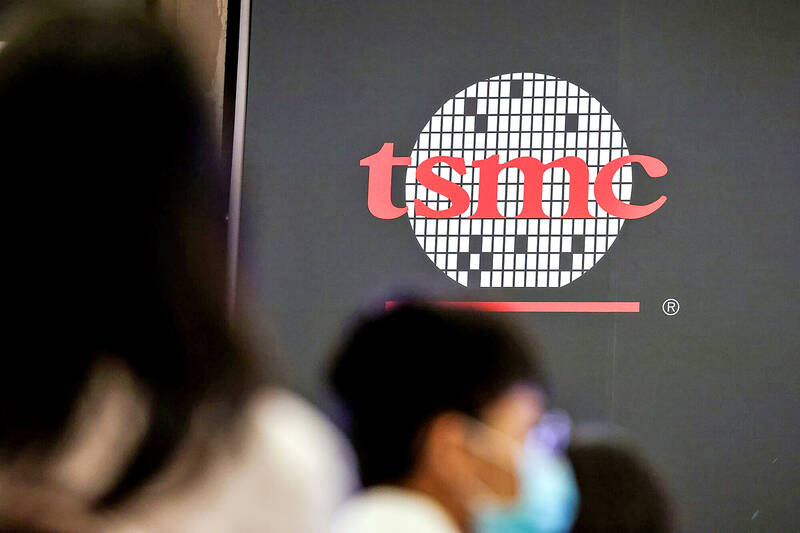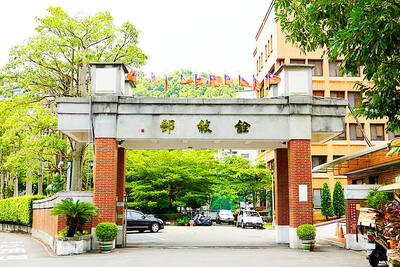Taiwan Semiconductor Manufacturing Co (TSMC, 台積電) yesterday said it expects to receive permanent authorization to continue operating a chip manufacturing factory in Nanjing after being granted an extension to a waiver to supply US chip equipment to its factories in China.
The world’s biggest contract chipmaker said it has been authorized to continue operating in Nanjing, where TSMC is expanding its 28-nanometer chip capacity to satisfy demand.
Last year, the chipmaker received a one-year authorization to operate the Nanjing fab deploying 28-nanometer and 16-nanometer technologies.

Photo: I-Hwa Cheng, Bloomberg
The Chinese market contributed about 12 percent to the company’s total revenue in the second quarter.
“We are in the process of applying for a permanent authorization for our operations in China,” TSMC said in a statement. “We have been advised by the [US] Department of Commerce’s Bureau of Industry and Security to apply for Validated End-User [VEU] authorization, which would serve as a permanent authorization.”
The authorization has existed since 2007, but TSMC has not needed it previously, the chipmaker said.
“We expect to receive a permanent authorization through the VEU process,” TSMC said.
It has a modest campus in a Shanghai suburb and operates a site in Nanjing that makes 16-nanometer chips, four generations behind leading-edge technology.
Samsung Electronics Co and SK Hynix Inc have been effectively granted an indefinite waiver on broader restrictions banning the shipment of advanced US chipmaking gear to China, South Korea’s presidential office said earlier this week.
Sweeping US regulations announced in October last year struck at the heart of Beijing’s tech ambitions, but also cast uncertainty over foreign chipmakers in China, including TSMC and its South Korean peers.
All three firms secured one-year waivers at the time, which allowed them to import vital equipment, but have since grappled with uncertainty over whether the exemptions would be extended.
US President Joe Biden’s administration late last month also removed a stringent curb on expansion in China by semiconductor companies that receive federal funds to build plants in the US.
TSMC and Samsung are expected to secure US subsidies for new facilities in the country.
Separately, TSMC is planning to produce 6-nanometer chips at its second plant in Japan, which is under construction, the Nikkei reported yesterday.
The chips would be manufactured in a new facility that TSMC is planning at its Kumamoto site in southwestern Japan, it said.
Total investment is estimated at ¥2 trillion (US$13.4 billion), with the Japanese Ministry of Economy, Trade and Industry considering providing up to ¥900 billion, the report said.
They would be the most advanced semiconductor products to be made in the country.
The Japanese government is putting together aid for the semiconductor sector as part of an economic stimulus package that would be finalized as soon as the end of this month.
The support would include subsidies for the second TSMC plant.
The ministry has asked for ¥3.35 trillion for this fiscal year’s supplementary budget.
Additional reporting by Bloomberg

Taiwan Semiconductor Manufacturing Co (TSMC, 台積電) is expected to start construction of its 1.4-nanometer chip manufacturing facilities at the Central Taiwan Science Park (CTSP, 中部科學園區) as early as October, the Chinese-language Liberty Times (the Taipei Times’ sister newspaper) reported yesterday, citing the park administration. TSMC acquired land for the second phase of the park’s expansion in Taichung in June. Large cement, construction and facility engineering companies in central Taiwan have reportedly been receiving bids for TSMC-related projects, the report said. Supply-chain firms estimated that the business opportunities for engineering, equipment and materials supply, and back-end packaging and testing could reach as high as

CHAMPIONS: President Lai congratulated the players’ outstanding performance, cheering them for marking a new milestone in the nation’s baseball history Taiwan on Sunday won their first Little League Baseball World Series (LLBWS) title in 29 years, as Taipei’s Dong Yuan Elementary School defeated a team from Las Vegas 7-0 in the championship game in South Williamsport, Pennsylvania. It was Taiwan’s first championship in the annual tournament since 1996, ending a nearly three-decade drought. “It has been a very long time ... and we finally made it,” Taiwan manager Lai Min-nan (賴敏男) said after the game. Lai said he last managed a Dong Yuan team in at the South Williamsport in 2015, when they were eliminated after four games. “There is

Democratic nations should refrain from attending China’s upcoming large-scale military parade, which Beijing could use to sow discord among democracies, Mainland Affairs Council Deputy Minister Shen You-chung (沈有忠) said. China is scheduled to stage the parade on Wednesday next week to mark the 80th anniversary of Japan’s surrender in World War II. The event is expected to mobilize tens of thousands of participants and prominently showcase China’s military hardware. Speaking at a symposium in Taichung on Thursday, Shen said that Chinese Minister of Foreign Affairs Wang Yi (王毅) recently met with Indian Prime Minister Narendra Modi during a visit to New Delhi.

FINANCES: The KMT plan to halt pension cuts could bankrupt the pension fund years earlier, undermining intergenerational fairness, a Ministry of Civil Service report said The Chinese Nationalist Party (KMT) caucus’ proposal to amend the law to halt pension cuts for civil servants, teachers and military personnel could accelerate the depletion of the Public Service Pension Fund by four to five years, a Ministry of Civil Service report said. Legislative Speaker Han Kuo-yu (韓國瑜) on Aug. 14 said that the Act Governing Civil Servants’ Retirement, Discharge and Pensions (公務人員退休資遣撫卹法) should be amended, adding that changes could begin as soon as after Saturday’s recall and referendum. In a written report to the Legislative Yuan, the ministry said that the fund already faces a severe imbalance between revenue